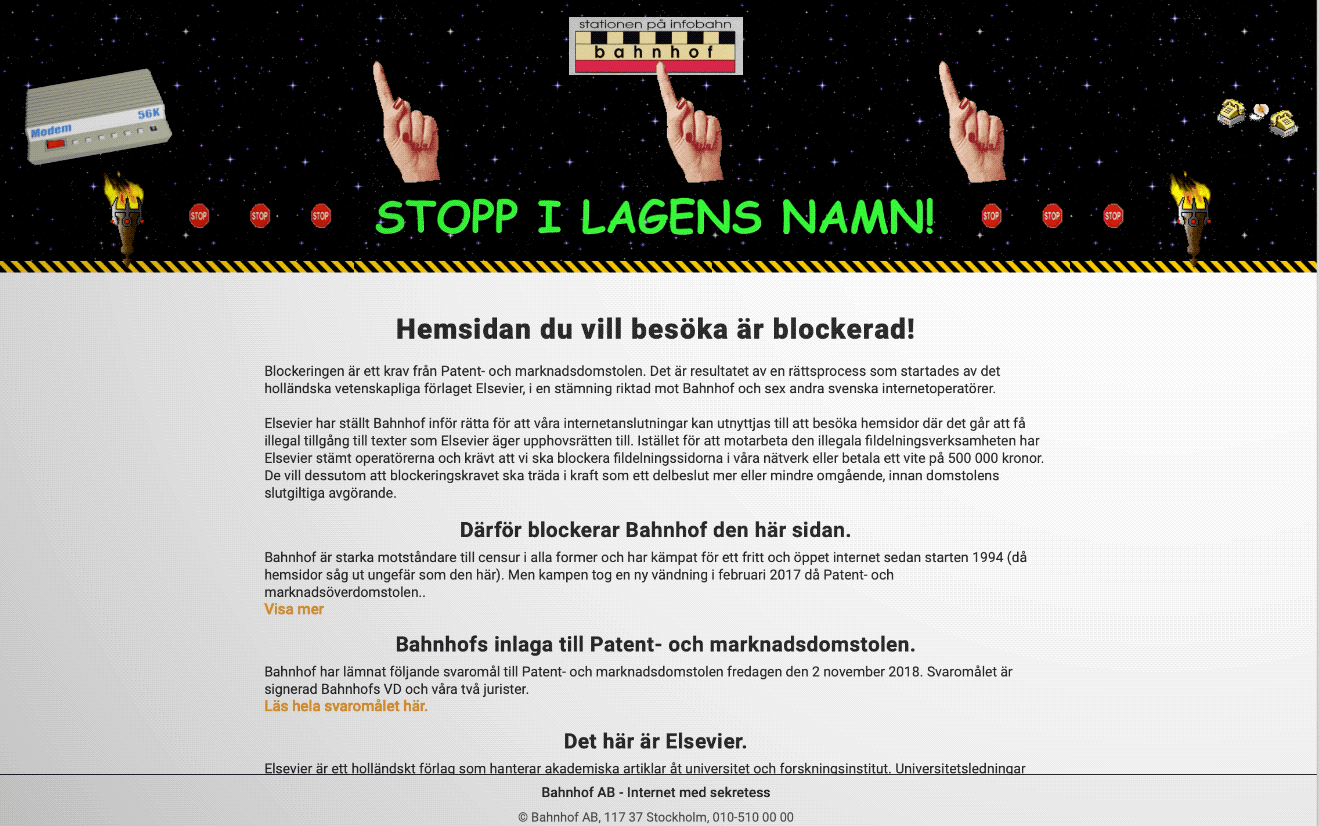
Bahnhof’s page blocking access to Sci-Hub. (Screenshot: TechCrunch)
A little known fact about Swedes: when they get angry, they will often scribble down a note on paper — sometimes anonymously — and leave it where it will be seen, rather than confront a person face-to-face.
One extremely angry Swedish pro-freedom internet provider took that passive aggression to a whole new level.
On Thursday, Stockholm-based Bahnhof was ordered by a Swedish copyright court to block Sci-Hub, a pirate site dedicated to free access to academic papers and research. The site, operated by a Kazakh student Alexandra Elbakyan, has faced court orders and threats of site blocks across Europe, following lawsuits from academic publishers like Elsevier, which brought the most recent case.
Bahnhof was forced to block 20 domains associated with Sci-Hub, according to the company’s response to the court order.
Resigned to the fact that it was unlikely to win an appeal, the internet provider called the publisher “greedy opportunists,” and then blocked Elsevier’s own website in protest.
“Bahnhof opposes to censorship in every way, shape and form, but it looks like we won’t be able to dodge Elsevier’s blocking requirement,” the company said on a holding page that Bahnhof’s customers would see when trying to access Elsevier’s website. The internet provider put up the block “to make sure that they themselves also get a taste of the blocking they’re currently evoking against others.”
The page, featuring a dial-up modem sound and a retro late-1990’s font and layout, was a jab at what the internet provider sees as a regressive step in the internet’s history.
Elsevier, a Dutch academic publisher, has had Sci-Hub in its sights for years. The company sued its creator, Elbakyan, in 2015 as the site continued to grow in submissions and popularity. The site gave reporters and journalists, activists, the generally curious public — and even academics — access to expensive and paywalled content.
Sci-Hub now has more than 70 million academic papers and journals, helping millions to skirt Elsevier’s subscription costs — in some cases millions of dollars per year.
Many colleges and institutions have been critical of the academic publishing business. Harvard University specifically called out “certain publishers” in 2012 that the rising costs of subscriptions would render their ongoing contracts “untenable.”
“Their business model is also constructed in such a way that the universities and research institutes must pay even to access their own papers, because they have been published through Elsevier,” said Bahnhof.
Academics, too, have mixed views on Sci-Hub, though many have come out in support of the pirate site — despite its illegality — to promote free and open access to academic research. Dr. Holly Witteman, an associate professor in medicine at Université Laval in Quebec City, explained in a tweet thread earlier this year how academic papers are published.
(Spoiler alert: most academics aren’t paid.)
“The reason most academic authors are delighted to share our papers is because it’s our job to create and share knowledge!” she said.
Elsevier spokesperson Tom Reller confirmed the publisher’s legal action, adding that Sci-Hub “infringes intellectual property rights on a massive scale.”
“The risks posed by Sci-Hub and other illegal sites are exacerbated by the way they operate: subverting authentication technology, and reportedly using stolen user credentials and phishing attacks,” the spokesperson said in an email to TechCrunch. “Sci-Hub’s illegal activities harm learned societies who are reliant on subscription income to support their important work; it is a threat to the scholarly communications ecosystem, the sustainability of high quality journals as well as the ability to invest in new journals and fields.”
Bahnhof’s interstitial page isn’t a hard block — users can click through to go to Elsevier’s website. “This page you are in front of right now is the result, this is what is expected in the future where private interests can regulate community information,” the page says.
“Is it really this way our judiciary should be used? No, we do not like either,” it adds.
When internet providers get angry, they get even.